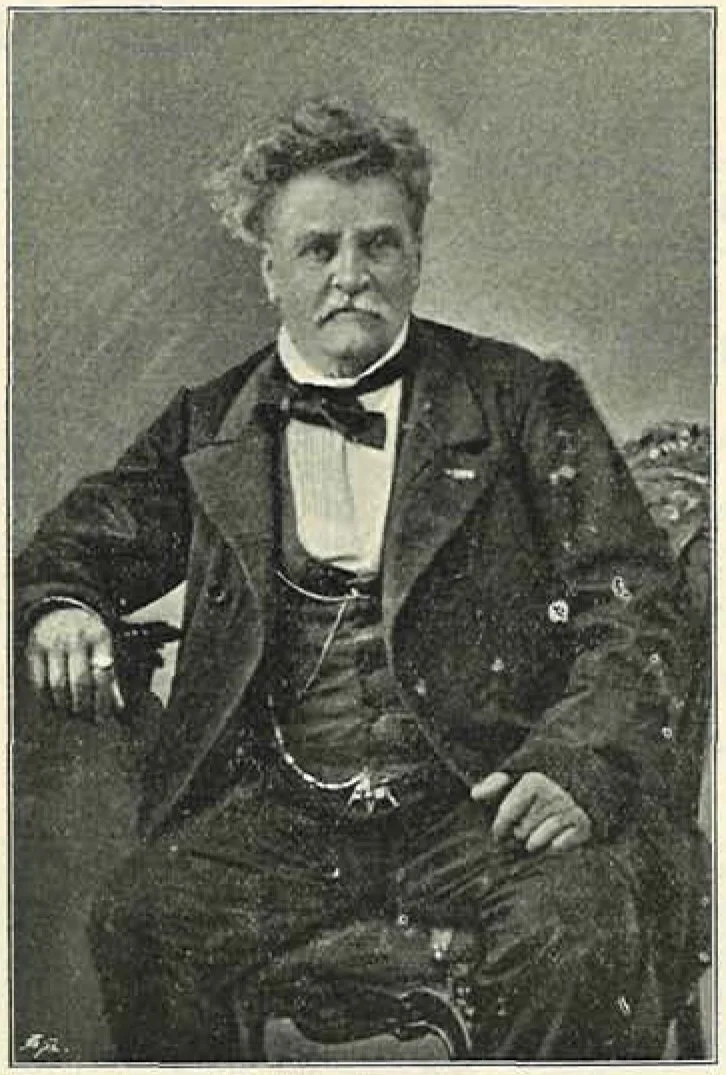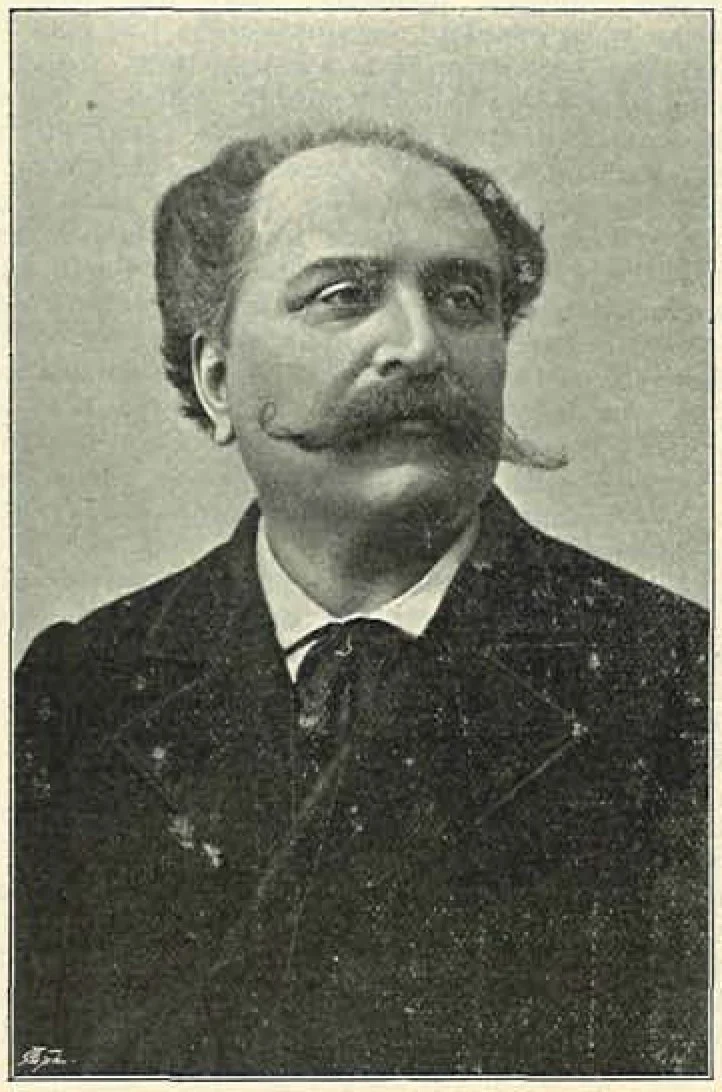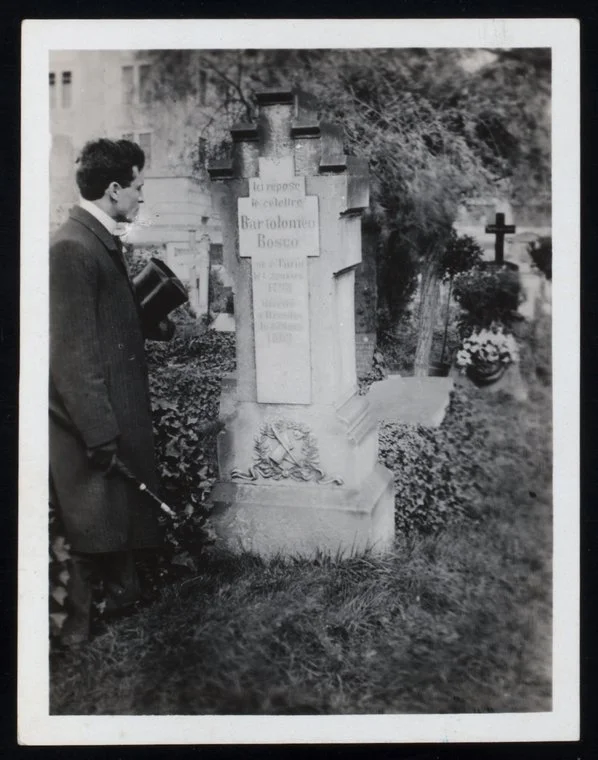The Original Bosco - - - The Famous Italian Magician
By Dr. A. M. Wilson & Harry Houdini*
*It appears that the article was not written by Houdini as he references himself but there is also reference to the author of the article being the same author who has written articles by Houdini so I believe he was involved in the writing of it. He may be responsible for writing the entire thing but in the third person but as no one is credited and the reference to it’s author being the editor I am unsure which of these two men wrote it. - Mahdi
From the Houdini Collection
Every theatre-goer who has laughed and wept with Dave Warfield in "The Music Master," will recall the whimsical fashion in which the character-actor refers to the dime museum freak "Bosco."
"Bat 'em alive! sighs the German music master, eat 'em alive," and the entire audience sighs too, though it has no idea of the real tragedy which lies behind that term "eat 'em alive."
"Bosco," the human fiend who swallows snakes alive, took his name from one of the most brilliant yet tragic names in the history of magic. The original Bosco was a famous magician in the early part of the nineteenth century, a man of rare attainments whose name has been dragged to the lowest depths by dime museum and county fair fakirs.
Robert Houdin Derides Bosco.
In his remarkable book "The "Unmasking of Robert Houdin," Harry Houdini tells just how the name of this great artist was traduced and dragged in the mire. The French conjurer Robert Houdin scored the original Bosco so pitilessly, though unjustly, that his name became synonymous with cruelty; consequently, the first fakir who performed the revolting snake-eating act, which so tries the gentle spirit" of Mr. Warfield's "Music Master," assumed the name of one of the world's greatest magicians.
In his autobiography, an American Edition:
"Robert Houdin devoted the greater part chapter X, to belittling Bosco. First, he pictures Bosco as a most cruel creature who literally tortured to death birds used in his performances, but here, as in his attack on Pinetti, Robert Houdin throws the repsonsibility for criticism on the shoulders of another. His old friend, Antonio, accompanies him to watch Bosco's performance, and it is Antonio, throughout the narrative, who rebels against Bosco's cruelty and Antonio who insists upon leaving before the performance closes, because the cruelty of the conjurer nauseates him.
"At that time no society for the protection of animals existed, and, even if it had, it is doubtful if Bosco's performance would have come under the ban. Certain magicians of to-day employ many of Bosco's tricks in which birds and small animals are used, but the conjuring is deftly done and the public accepts it, as it did in 1838, as skillful sleight-of-hand work and that the birds are neither hurt nor killed. Even in Bosco's time the bird trick was not in his repertoire exclusively. All English magicians employed it. Apparently the head of the fowl was amputated, but in reality it was tucked under the wing, and the head and neck of another fowl substituted as having been wrenched from the neck of the bird. Quite probably the Parisian public did not consider Bosco cruel. Robert Houdin and his friend Antonio, though versed in sleight-of-hand and conjuring methods, attributed the effect as a result of cruelty. Certain it is that the name of Bosco has not been handed down to posterity by other writers as a synonym of cruelty." In his book Houdini writes:
Bosco in old age
From the Houdini Collection
Jealousy Evident in the Attack.
"The animus of Robert Houdin's attack on Bosco is evident at every point of the narrative. Now he accuses him of bad taste in appearing in the box-office. Again he suggests that the somewhat impressive opening of Bosco's act savors of both charlatanism and burlesque, when in reality the secret of showmanship consists of not what you really do, but what the mystery loving public think you do. Bosco undoubtedly secured precisely the effect he desired, because Robert Houdin devotes more than a page in a most unnecessary attempt to explain away what he considered Bosco's undeserved popularity, thereby apparently revealing his own personal animosity if not jealously of the man's reputation."
Bosco was not only a clever magician, but a man of many adventures, so that his life reads like a romance. This soldier of fortune, Bartolomeo Bosco, was born of a noble Piedmont family, on January 11, 1790, in Turin, Italy. From boyhood he showed great ability as a necromancer, but at the age of nineteen he was forced to serve under Napoleon I, in the Russian campaign. He was a fusilier in the Eleventh Infantry, and at the battle of Borodino was injured in an engagement with Cossacks. Pierced by a lance, he lay upon the ground apparently dead. It is written that a Cossack roamed callously among the dead and dying, rifling pockets and belts. When he came to the form of Bosco, that youth feigned death, knowing that resistance to the ghoul meant a death wound. But while the Cossack robbed the Italian soldier, the latter stealthily raised his unwounded arm and by deft manipulation rifled the well-filled pockets of the ghoul, which fact was not discovered by the Cossack until he was far from the field of the dead and dying where he had left one of the enemy considerably better off, thanks to Bosco's conjuring talent.
Eugene Bosco
From the Houdini Collection
Prisoner in Siberia.
Bosco was sent captive to Siberia, where he perfected his sleight-of-hand while amusing fellow-prisoners and jailers. In 1814 he was released and returned to his native land, where he studied medicine, but eventually decided to become a public entertainer. He was not only a clever entertainer, but a good business man, and he planned on saving enough money each year to insure a life of ease in his old age. But events intervened to ruin his well-laid plans. The sins of his youth brought their penalty. An illegitimate son, Eugene, became a heavy drag upon the retired magician, who was compelled to pay large sums to the young man in order to prevent his playing in either France or Germany, and assuming the name of Bosco. In the shop of a German antique dealer Houdini found a document, an agreement, in which Bosco pledged himself to pay this illegitimate son five thousand francs for not using the name of Bosco. This agreement, a lengthy document, tells all too eloquently the troubles which beset Bosco in his old age.
Eugene was said to be the superior of his famous father in sleight-in-hand, but he was wild and given to excesses. Women and wine checked what might have been a brilliant professional career. Disabled, poverty-stricken, and respected by none, he soon disappeared from the conjuring world, and according to Carl Willman in the Zauberwelt, he died miserably in Hungary, in 1891.
Harry Houdini Buys Bosco's Grave.
In their latter days, Bosco and his wife lived in poverty in Dresden, and it was there that the once brilliant conjurer died March 2, 1862. His wife died three years later and was interred in the grave with her husband in a cemetery on Priedrichstrasse. There was nothing on the tombstone to indicate the double interment, and Houdini discovered the fact only by investigating the municipal and cemetery records. Here he also learned that the grave had merely been leased, and as the lease was about to expire the bones of the great conjurer and his faithful wife would soon be disinterred and reburied in a neglected corner of the graveyard devoted to the poor and unclaimed dead. To prevent this, Houdini purchased the lot and tombstone, and presented Deed for the same to the Society of American Magicians.
Harry Houdini pays his respect at Bartolemeo Bosco’s grave.
A man of noble birth and brilliant attainments was the original Bosco, and his name became a by-word all over the Continent as the synonym, not of cruelty, but of clever deception, yet never has posterity put the name of a great performer to such ignoble use.
Houdini writes, "To-day I can close my eyes and summon two visions. First I see myself standing bareheaded before a neglected grave in the quiet cemetery on Friedrichstrasse (the sunlight pouring down upon the tombstone which bears not only the cup-and-balls and wand, insignia of Bosco's most famous trick, but this inscription: Ice repose le celebre Bartolomeo Bosco—Ne a Turin le II Janvier, 1793; decede Dresden le 2 Mars, 1863). And the history of this clever conjurer, with all its lights and shadows, sweeps before me like a mental panorama.
"The second vision carried me into the country, to the fairs of England and the side shows of America.
"Who has not heard the cry of the modern Bosco?
"Bosco! Bosco! Eat 'em alive Bosco. You can't afford to miss this marvel. Bosco! Bosco!
Depravity of the Lowest Type.
'Follow me into the enclosure and gaze down into a den. There lies a half-naked human being. His hair is long and matted, a loin cloth does wretched duty as clothing. Torn sandals are on his feet. The eulogistic lecturer dilates upon the powers of this twentieth-century Bosco, but you do not listen. Your fascinated gaze is fixed on various hideous, wriggling, writhing forms on the floor of the den. Snakes—scores of them. Now the creature, half animal, half human, glances up to make sure that attention is riveted upon him, then grasps one of the serpents in his hideous hands and in a flash bites its head. The writhing body falls back to the ground.
You grip the railing in a sudden faintness. Has your brain deceived your eyes, or your eyes your brain? If you are a conjurer you try to convince yourself that it is all a clever sleight-of-hand exhibition, but in your heart you know that is not true. This creature, so near a beast, has debauched his manhood for a few paltry dollars, and in dragging himself down has dragged down the name of a worthy, brilliant, world-famous performer.
Bosco Defilers.
Of the twentieth century Boscos there are, alas, many. You will find them all over the world, in street carnivals, side shows, fair booths, and museums, and why the public supports such debasing exhibitions it is exceedingly difficult to understand." Houdini further writes: "I have seen half-starved Russians pick food from refuse-barrels. I have seen besotted Americans creep out from low dives to draw the dregs of beer barrels into tomato cans. I have seen the absinthe fiends in Paris stoop to unmentionable actions to obtain their beloved stimulant. I have heard morphine fiends promise to exhibit the effect of the needle in return for the price of an injection, but never has my soul so risen in revolt as at sight of this bestial exhibition with which the name of Bosco, a nobleman and conjurer of merit, has been linked."
A. S. R.
(Copy of agreement, translated from the French, original in the possession of Harry Houdini.)
BETWEEN THE UNDERSIGNED.
Mr. BARTHOLOMEO BOSCO, physician, residing at Paris, Boulevard Montmarte, No. 11, party of the first part, and Mr. EUGENE BOSCO, Son, physician, likewise residing at Paris, Rue de la Michodiere, No. 9, party of the second part,
THE FOLLOWING AGREEMENT HAS BEEN MADE:
Mr. Bosco, Sr., after having provided for the education and instruction of his son, after having several times furnished his son the means for his work and that he might make a living honestly, after having paid his debts several times and provided for his necessities up to the age of twenty-three years, desiring that his son shall in future neither have nor claim anything further from him, and considering that the same has expressed his willingness to separate himself from him; that, of his own accord, he declares himself sufficiently old to support himself and able to provide his own living by work;
THEREFORE, Mr. Bosco, Sr. agrees to loan his son, for the last time, the money he requires for the payment of his debts and to leave France, with all the physical material which has already been ceded to him by Mr. Bosco, Sr., and which is insufficient for the exercise of his profession and to earn a living.
Mr. Eugene Bosco, son, acknowledging the truth of the preceding statements and accepting all the conditions of these presents, agree in writing and upon his honor to carry out, point for point, all the wishes of his father in this connection and to at once leave France for a foreign country and from there to continue his voyages.
He acknowledges that he owes his father, Mr. Bosco, a sum of THREE THOUSAND francs which the latter has borrowed in order to make his son this last advance, and as a guarantee for this sum there will be drawn, by the third party who loaned this amount, a draft for the same sum, payable two years from this date.
Mr. Eugene Bosco further agrees not to return to France before the expiration of the aforesaid term of two years and not to return to France under whatever name or pretext before the payment of aforesaid draft, nor to call himself, nor allow himself to be called by any other name than EUGENE BOSCO FILS, binding himself to all the foregoing with all he now possesses or ever will possess.
IN CONCULSION Mr. Eugene Bosco agrees formally never to do anything which might bring discredit upon or harm to the reputation and esteem enjoyed by the name of Bosco in Europe, and to never present himself before his father, even in the event that he should become a millionaire, without the latter's consent.
Made in duplicate at Paris, this 20th day of May, One thousand eight hundred and fifty-two.
This Document is approved:
BARTOLOMEO BOSCO.
This Document is approved:
E. Bosco.
Originally published in the M-U-M in Vol. 7, No. 60, in New York, March 1918.




